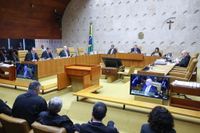On Thursday, April 3, 2025, the Supreme Federal Court (STF) of Brazil announced significant changes to the operational guidelines for security forces in Rio de Janeiro's communities, particularly in light of the ongoing issues surrounding police lethality and organized crime. This decision, known as the ADPF das Favelas, marks a critical moment in the relationship between law enforcement and the residents of these often marginalized areas.
The unanimous ruling by the STF replaces the previous requirement that police operations could only occur in exceptional circumstances. Instead, the court has mandated a framework focused on the proportionality of force used during these operations. The ruling aims to ensure that law enforcement actions are justified, documented, and conducted within a structured protocol.
According to the president of the STF, Minister Luís Roberto Barroso, this decision is part of a broader structural process that includes a diagnosis of the current situation, an actionable plan, and ongoing monitoring to protect fundamental rights. "The unanimity of votes is very symbolic. It signals a consensus within the STF regarding the need to defend the fundamental rights of the population," Barroso commented.
Among the highlights of this ruling are several critical measures aimed at enhancing accountability and oversight of police activities. These include the requirement for the state government of Rio de Janeiro to present a comprehensive plan for occupying areas dominated by organized crime. Additionally, there are new stipulations regarding the use of force, which must now be proportional to the context of each operation.
One of the more controversial aspects of the ruling is the allowance for police operations near schools and health facilities, which will now be permitted in exceptional cases where there is evidence of criminal activity. This has raised concerns among experts and advocates for human rights, who fear that such operations could endanger vulnerable populations, particularly children.
Daniel Hirata, a coordinator at the Geni-UFF research group, expressed his concerns about this change. "While there are many advancements, the significant setback is the loss of protection for the perimeter of educational and health units. Schools should be safe havens for children, and the STF's ruling does not adequately protect them during operations," he stated.
Hirata's sentiments are echoed by attorney Ítalo Pires Aguiar, who emphasized that the ruling does not give police a 'blank check' for operations. "The necessity to justify actions remains, now inserted into the context of specific rules and protocols approved by the Court," Aguiar explained.
Furthermore, the STF has mandated that all police operations must now include the presence of ambulances, particularly in planned operations where there is a risk of armed conflict. This measure aims to ensure immediate medical assistance is available should any injuries occur during these operations.
In terms of oversight, the ruling also reinforces the role of the Public Ministry in investigating police actions, particularly in cases resulting in fatalities. The STF has set forth detailed procedures for how the government should handle operations that result in deaths, emphasizing the importance of preserving crime scenes and ensuring thorough investigations.
Additionally, the STF has mandated the installation of cameras in police vehicles within 180 days, complementing the existing requirement for officers to wear body cameras. This move is intended to enhance transparency and accountability during police operations.
However, the ruling does not come without its critics. Minister Edson Fachin, the rapporteur of the case, defended the measures against accusations that they impede police effectiveness. He stated, "These measures have contributed to the reduction of police lethality rates and the number of victims from police shootings."
Despite the positive intentions behind the ruling, many experts remain cautious. The potential for misuse of the new guidelines, particularly concerning operations near schools and hospitals, raises significant concerns about the safety of civilians during police actions.
Moreover, the ruling stipulates that police forces are not required to inform the public in advance about the execution of operations, which could lead to increased tension within communities already wary of police presence.
As the government of Rio de Janeiro begins to implement these new guidelines, the focus will undoubtedly shift to how effectively these measures can be enforced and whether they will lead to meaningful change in the relationship between law enforcement and the communities they serve.
In conclusion, the STF's ruling represents a pivotal moment in Brazil's ongoing struggle to balance public safety with the protection of human rights. As the country grapples with the complexities of crime and policing, the success of these measures will depend on their careful implementation and the commitment of all parties involved to uphold the rule of law.





